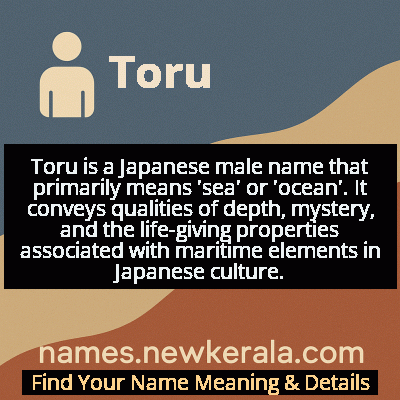Toru Name Meaning & Details
Origin, Popularity, Numerology Analysis & Name Meaning of Toru
Discover the origin, meaning, and cultural significance of the name TORU. Delve into its historical roots and explore the lasting impact it has had on communities and traditions.
Name
Toru
Gender
Male
Origin
Japanese
Lucky Number
2
Meaning of the Name - Toru
Toru is a Japanese male name that primarily means 'sea' or 'ocean'. It conveys qualities of depth, mystery, and the life-giving properties associated with maritime elements in Japanese culture.
Toru - Complete Numerology Analysis
Your Numerology Number
Based on Pythagorean Numerology System
Ruling Planet
Moon
Positive Nature
Diplomatic, friendly, artistic, empathetic.
Negative Traits
Over-sensitive, moody, indecisive, prone to self-pity.
Lucky Colours
Green, cream, white.
Lucky Days
Monday.
Lucky Stones
Pearl, moonstone.
Harmony Numbers
1, 3, 4.
Best Suited Professions
Diplomats, mediators, caregivers, artists.
What People Like About You
Cooperative spirit, friendliness, artistic talent.
Famous People Named Toru
Toru Takemitsu
Composer
Internationally renowned composer who blended Japanese and Western musical traditions
Toru Hashimoto
Politician
Former mayor of Osaka and prominent political figure in Japan
Toru Iwatani
Video Game Designer
Creator of the iconic arcade game Pac-Man
Toru Oikawa
Volleyball Player
Professional volleyball setter and Olympic medalist for Japan
Name Variations & International Equivalents
Click on blue names to explore their detailed meanings. Gray names with will be available soon.
Cultural & Historical Significance
The name's cultural significance extends beyond its literal meaning to encompass broader Japanese values. It represents the concept of 'mono no aware' - the awareness of impermanence and gentle sadness, much like the eternal yet changing nature of the sea. In business and social contexts, a person named Toru might be expected to demonstrate the reliability and depth associated with oceanic qualities. The name also connects to Japan's fishing heritage and maritime history, serving as a reminder of the nation's dependence on and respect for the sea. Throughout Japanese literature and art, characters named Toru often embody traditional virtues while navigating modern challenges, making the name a bridge between Japan's past and present.
Extended Personality Analysis
Individuals named Toru are often perceived as having calm, deep personalities reminiscent of the ocean itself. They tend to be thoughtful, introspective, and possess an inner strength that isn't immediately apparent. Like the sea, they can appear tranquil on the surface while containing great depth and complexity beneath. These individuals typically demonstrate adaptability and resilience, able to navigate life's challenges with grace and determination. They often have strong intuitive abilities and emotional intelligence, making them excellent listeners and trusted confidants. Their connection to water symbolism suggests they can be both nurturing and powerful, capable of great gentleness but also formidable when provoked.
In social settings, Torus are often the stabilizing force in their relationships and communities. They approach problems with patience and thorough consideration, rarely making impulsive decisions. Their maritime namesake influences their approach to life - they understand that, like the tides, circumstances change, and they possess the wisdom to know when to advance and when to retreat. Many Torus are drawn to careers that involve caregiving, teaching, or creative expression, where their natural empathy and depth of character can shine. They value authenticity in relationships and tend to form deep, lasting bonds with those who appreciate their quiet strength and loyalty. While they may not seek the spotlight, their influence is often profound and far-reaching.
Modern Usage & Popularity
In contemporary Japan, Toru remains a respected and moderately popular male name, though it has seen some decline in recent decades as parents increasingly favor more modern or international-sounding names. The name maintains its traditional appeal while being versatile enough for modern professional contexts. It's particularly favored by families with coastal backgrounds or those who appreciate the natural symbolism associated with the sea. Outside Japan, Toru has gained some recognition through Japanese cultural exports and is occasionally used by families of Japanese descent living abroad. The name's simplicity and strong cultural identity make it appealing to parents seeking a name that is both distinctly Japanese and accessible to international audiences. While not among the top 100 most popular names in recent years, Toru continues to be chosen by parents who value its traditional roots and the positive qualities it represents.
Symbolic & Spiritual Meanings
The name Toru carries rich symbolic meanings derived from its association with the sea. It represents depth—both emotional and intellectual—suggesting a person who possesses hidden strengths and profound understanding. Like the ocean, it symbolizes constant movement and change while maintaining core stability, indicating adaptability and resilience. The name also conveys transparency and clarity, as some kanji interpretations relate to light passing through or penetrating truth. In Japanese symbolism, water represents life, purification, and flow—qualities that translate to a person who brings vitality, cleanses negative energy, and moves gracefully through life's journey. The maritime connection further symbolizes exploration, mystery, and the unknown, suggesting a person comfortable with uncertainty and drawn to discovery. These symbolic associations create a multidimensional identity that combines strength with sensitivity, tradition with forward movement.

